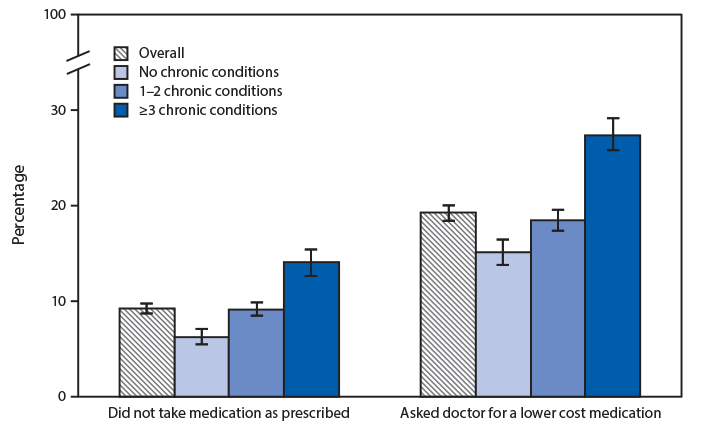QuickStats: Percentage* of Adults Aged ≥18 Years Who Did Not Take Their Medication as Prescribed or Asked for Lower-Cost Medication to Save Money Among Those Prescribed Medication in the Past 12 Months,† by Number of Chronic Conditions§ — National Health Interview Survey, 2018¶
Weekly / November 1, 2019 / 68(43);990

* With 95% confidence intervals indicated by error bars.
† Based on the following questions asked of adults prescribed medication in the past 12 months: During the past 12 months, were any of the following true for you? 1) You skipped medication doses to save money, 2) You took less medication to save money, 3) You delayed filling a prescription to save money, or 4) You asked your doctor for a lower-cost medication to save money. The category “Did not take medication as prescribed” includes adults who skipped medication doses, took less medication, or delayed filling a prescription.
§ The number of chronic conditions is based on reporting ever being diagnosed with: hypertension, coronary heart disease, stroke, diabetes, cancer, arthritis, hepatitis, chronic obstructive pulmonary disease (COPD) or asthma, or reporting weak or failing kidneys in the past 12 months. COPD was defined as ever having COPD or emphysema or having chronic bronchitis during the past 12 months.
¶ Estimates are based on household interviews of a sample of the civilian, noninstitutionalized, U.S. population and are derived from the National Health Interview Survey Sample Adult component.
In 2018, among adults aged ≥18 years who were prescribed medication in the past 12 months, the percentage who did not take their medication as prescribed to save money increased with the number of reported chronic conditions, from 6.2% with no chronic conditions to 9.1% with 1–2 chronic conditions and 14.0% with ≥3 chronic conditions. The percentage who asked their doctor for a lower-cost medication also increased with the number of reported chronic conditions from 15.1% among those with no chronic conditions to 18.4% among those with 1–2 chronic conditions and 27.4% among those with ≥3 chronic conditions.
Source: National Health Interview Survey, 2018 data. https://www.cdc.gov/nchs/nhis.htm.
Reported by: Amy E. Cha, PhD, oty6@cdc.gov, 301-458-4236; Robin A. Cohen, PhD.
Suggested citation for this article: QuickStats: Percentage of Adults Aged ≥18 Years Who Did Not Take Their Medication as Prescribed or Asked for Lower-Cost Medication to Save Money Among Those Prescribed Medication in the Past 12 Months, by Number of Chronic Conditions — National Health Interview Survey, 2018. MMWR Morb Mortal Wkly Rep 2019;68:990. DOI: http://dx.doi.org/10.15585/mmwr.mm6843a6.
MMWR and Morbidity and Mortality Weekly Report are service marks of the U.S. Department of Health and Human Services.
Use of trade names and commercial sources is for identification only and does not imply endorsement by the U.S. Department of
Health and Human Services.
References to non-CDC sites on the Internet are
provided as a service to MMWR readers and do not constitute or imply
endorsement of these organizations or their programs by CDC or the U.S.
Department of Health and Human Services. CDC is not responsible for the content
of pages found at these sites. URL addresses listed in MMWR were current as of
the date of publication.
All HTML versions of MMWR articles are generated from final proofs through an automated process. This conversion might result in character translation or format errors in the HTML version. Users are referred to the electronic PDF version (https://www.cdc.gov/mmwr) and/or the original MMWR paper copy for printable versions of official text, figures, and tables.
Questions or messages regarding errors in formatting should be addressed to mmwrq@cdc.gov.